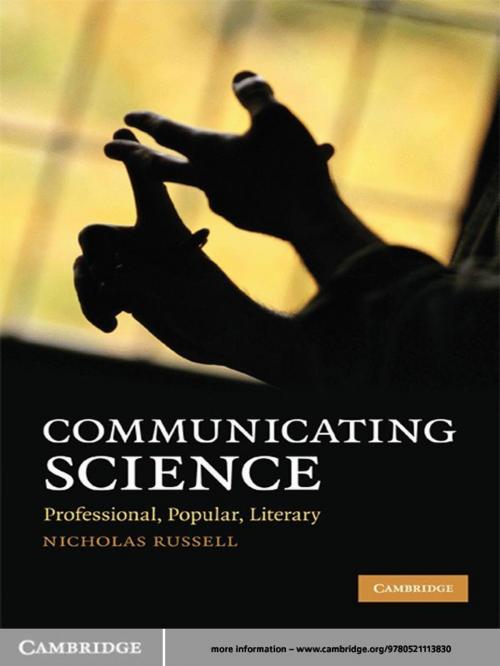Communicating Science
Professional, Popular, Literary
Nonfiction, Science & Nature, Science, Physics, General Physics, Reference & Language, Reference| Author: | Nicholas Russell | ISBN: | 9780511847554 |
| Publisher: | Cambridge University Press | Publication: | October 15, 2009 |
| Imprint: | Cambridge University Press | Language: | English |
| Author: | Nicholas Russell |
| ISBN: | 9780511847554 |
| Publisher: | Cambridge University Press |
| Publication: | October 15, 2009 |
| Imprint: | Cambridge University Press |
| Language: | English |
Governments and scientific establishments have been encouraging the development of professional and popular science communication. This book critically examines the origin of this drive to improve communication, and discusses why simply improving scientists' communication skills and understanding of their audiences may not be enough. Written in an engaging style, and avoiding specialist jargon, this book provides an insight into science's place in society by looking at science communication in three contexts: the professional patterns of communication among scientists, popular communication to the public, and science in literature and drama. This three-part framework shows how historical and cultural factors operate in today's complex communication landscape, and should be actively considered when designing and evaluating science communication. Ideal for students and practitioners in science, engineering and medicine, this book provides a better understanding of the culture, sociology and mechanics of professional and popular communication.
Governments and scientific establishments have been encouraging the development of professional and popular science communication. This book critically examines the origin of this drive to improve communication, and discusses why simply improving scientists' communication skills and understanding of their audiences may not be enough. Written in an engaging style, and avoiding specialist jargon, this book provides an insight into science's place in society by looking at science communication in three contexts: the professional patterns of communication among scientists, popular communication to the public, and science in literature and drama. This three-part framework shows how historical and cultural factors operate in today's complex communication landscape, and should be actively considered when designing and evaluating science communication. Ideal for students and practitioners in science, engineering and medicine, this book provides a better understanding of the culture, sociology and mechanics of professional and popular communication.















